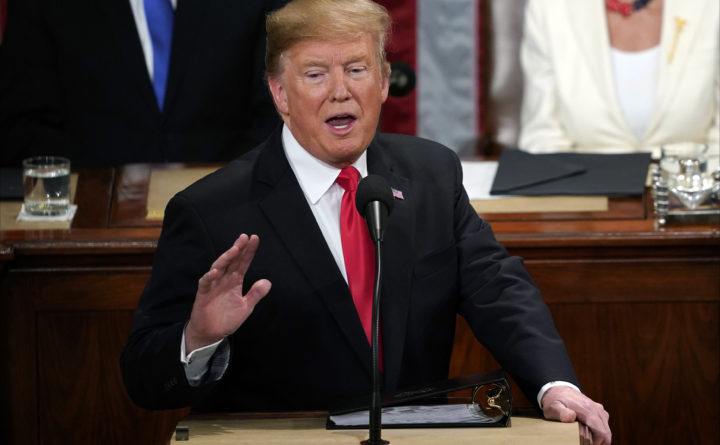
Maine’s congressional delegation found areas of agreement after President Donald Trump’s State of the Union address on Tuesday night but want to see the combative Republican follow through on his call for unity and cooperation.
Rep. Chellie Pingree, a Democrat from Maine’s 1st District, said the president touched on several areas where he can find agreement with congressional Democrats, such as investing in rural infrastructure, paid family leave and lower prescription drug prices.
“The disparity he noted about the higher prices Americans pay for medications compared to other countries is absolutely true, and [it’s] one I’ve introduced bipartisan legislation to address,” Pingree said.
In his address, Trump touted a decline in prescription drug prices, but data show drug prices are still rising. The Consumer Price Index for prescription drugs shows a 0.6 percent reduction in prices in December 2018 when compared with December 2017, the biggest drop in nearly 50 years, according to the Associated Press. But the CPI showed a 1.6 percent increase in 2018 over 2017.
While Pingree said she agreed with Trump’s call for Democrats and Republicans to work together, she said the big question is whether Trump will follow through on that message.
[Fact checking Trump’s claims in his State of Union address]
“We’re still recovering from the longest government shutdown in American history, and he has issued threats to start another if he doesn’t get his way on a border wall. If he is really serious about unity, he should stop demonizing those who seek safety in our country and start working in good faith with Congress on immigration, effective border security, and funding the government,” Pingree said.
Pingree also said it was “disappointing” that Trump did not address climate change in the speech and that he continues to “ignore this real crisis even as he manufactures others.”
In a symbolic gesture, Pingree had invited whistleblower Joel Clement, a Falmouth native who formerly served in the U.S. Department of Interior official before being demoted last year after filing a complaint against the Trump administration for ignoring the effects of climate change on Alaska natives.
U.S. Rep. Jared Golden, a Democrat from Maine’s 2nd District, said Trump’s focus on infrastructure investments and protecting American jobs with better trade deals are two areas where he could work with the president.
But Golden noted that Trump’s much-touted U.S.-Mexico-Canada Agreement, a renegotiated version of the North American Free Trade Agreement, needs “significant changes” to avoid “the same disastrous trade policies that have led to closed mills, outsourced jobs, and stagnant wages.”
That message was largely reflected in Golden’s guest to the State of the Union — Cynthia Phinney, the president of Maine’s largest labor federation, AFL-CIO. In a statement on Twitter before the address, Golden said the two agree with Trump that American workers have suffered under NAFTA, but that the renegotiated trade deal “looks like a new paint job on the old NAFTA.”
Golden also said that Trump’s proposal for infrastructure investments should not place the burden on local governments or small businesses.
“If the president can follow through on his bipartisan talk with bipartisan leadership, I’ll work with him to improve these proposals so they deliver results for Maine people,” Golden said.
U.S. Sen. Susan Collins, a Republican, welcomed Trump’s appeal for “greater unity” on Tuesday night, saying “we must come together to develop the solutions needed to move our country forward and improve the lives of all Americans.”
Like Pingree and Golden, Collins said she saw areas of agreement between Trump and Congress on investing in infrastructure and lowering prescription drug prices.
[Maine delegation’s guests to Trump speech reaffirm their 2019 priorities]
But that call for unity and bipartisanship will be tested in the coming days. On the heels of the longest government shutdown in U.S. history, negotiators are working to strike a deal between Congress and the White House on Trump’s demand for southern border wall funding before a Feb. 15 deadline, when appropriations funding several federal agencies will again lapse.
That 35-day stalemate that ended late last month centered on Trump’s demand for more than $5 billion for a wall along the U.S.-Mexico border, a demand that congressional Democrats have rebuffed.
Collins said last week on CBS’ “Face the Nation” that lawmakers can reach an agreement on “physical barriers” for the border but not necessarily the border wall that Trump envisions. Whether Trump will accept such an offer remains to be seen.
Trump threw cold water on the negotiations just as they started last week, saying the group of Republicans and Democrats were “wasting their time” if a border wall wasn’t part of the deal.
“Next week, we face a critical deadline to prevent what would be another destructive and harmful government shutdown. The recent shutdown was an example of how a refusal to compromise is a recipe for dysfunction that hurts American families and our economy,” Collins said Tuesday night.
U.S. Sen. Angus King, an independent who caucuses with Democrats, struck a cautious note in a statement to the Portland Press Herald late Tuesday night, saying “It was a speech that covered a lot of ground, but the challenge now is what actions will follow the president’s words.”
This article originally appeared on www.bangordailynews.com.




